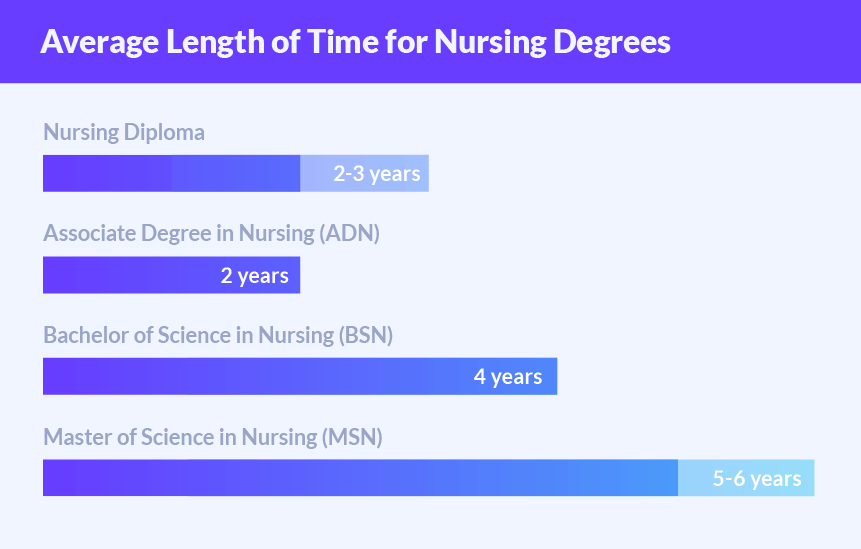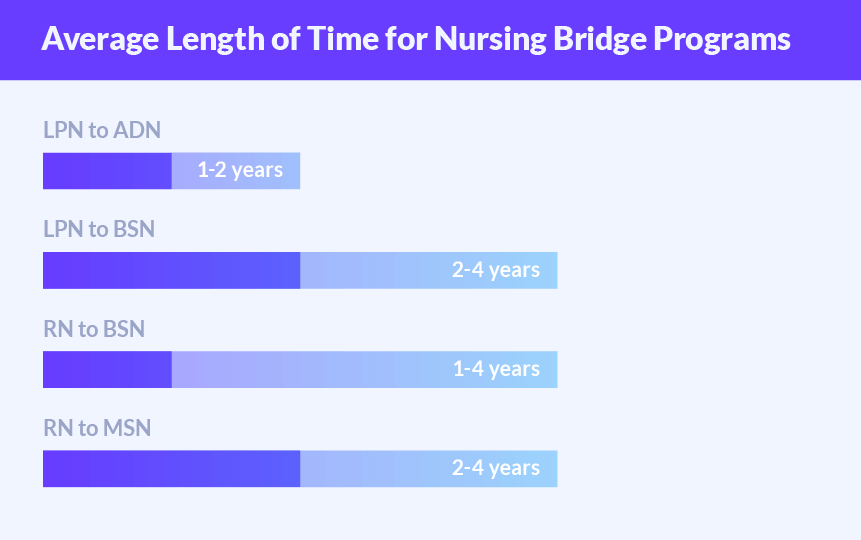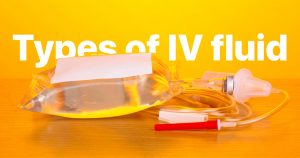Earning a nursing degree is the first step any prospective nurse takes in the course of becoming a nurse. Nursing school is where you learn all of the essential skills needed to perform the duties of a nurse and includes classroom training and clinical experience.
You’re reading one of our “Nursing Career Guide” articles. Need to practice for your upcoming exam? Have a look at our free NCLEX practice questions -- no registration required! ✨
There are many educational pathways to becoming a nurse so the length of time it takes to complete nursing school depends on the degree or certificate that you are pursuing and how committed you are to completing your education in a timely manner.
How long does it take to become a nurse?
Becoming a nurse can take a potential candidate 2-4 years depending on the type of degree they choose to pursue. The Associate Degree in Nursing (ADN) is the most common route to become a registered nurse, and usually takes about two years (or even less, if you choose the accelerated degree program).
Assuming that you are taking classes full-time, this is how long nursing school takes to complete on average:
- A nursing diploma or certificate takes 1-3 years to complete
- An Associate Degree in Nursing (ADN) takes 2 years to complete
- A Bachelor of Science in Nursing (BSN) takes 4-5 years to complete
- A Master of Science in Nursing (MSN) takes 5-6 years to complete
Below you’ll discover the different educational pathways that can lead you to become a nurse and the length of time each pathway takes. Of course, these are just general guidelines, and assume that you will be enrolled in nursing school full-time. If you take part-time classes then the length of time it takes you to complete the nursing school will be longer than if you were pursuing your education full-time.
Types of Degrees
Diploma or Certificate
Nursing diploma and certificate programs are typically offered directly by hospitals or in technical and community colleges. The curriculum of nursing diploma programs differs from nursing degree programs in that the courses are focused more on nursing areas of study rather than general education classes which you would take as part of a nursing degree. One benefit of nursing diplomas over a nursing degree is that there tends to be much more time spent in a clinical setting rather than the classroom which can help you gain relevant on-the-job experience quickly.
A nursing diploma program will prepare you for the NCLEX-PN exam which will, in turn, allow you to become a licensed practical nurse (LPN) or a licensed vocational nurse (LVN) depending on which state you reside in. However, nursing diplomas are becoming less common as nursing has become more demanding and complex so employers are becoming more likely to hire candidates with at least an ADN degree. Another drawback is that nursing diploma programs can take just as long as an ADN program but instead of a degree upon graduation, you only receive a certificate.
Associate Degree (ADN)
The Associate Degree in Nursing (ADN) is a 2-year nursing degree that prepares students to sit for their NCLEX-RN exam. Similar to a nursing diploma program, the ADN coursework focuses on nursing-specific topics as well as general education courses and includes both classroom learning and practical experience in a clinical setting. One benefit of an ADN over a nursing diploma is that employers prefer candidates with an ADN as the coursework is seen as more rigorous and in-depth.
Obtaining an ADN is a great step toward a career in nursing and many people use this degree as a stepping stone toward a higher degree. Another common strategy is to use an ADN to land an entry-level nursing position then use their employer’s tuition reimbursement programs to pay for a higher degree.
Bachelor of Science (BSN)
The Bachelor of Science in Nursing (BSN) is considered the gold standard for nursing education and many employers are now requiring a BSN degree for their entry-level positions. The reason for this is that a BSN degree program is seen as more in-depth and comprehensive than an ADN or nursing diploma. In addition to the core nursing coursework taught in the ADN, BSN programs also incorporate advanced nursing courses such as leadership, nursing informatics, research, community, and public health.
Students that graduate with a BSN have more career choices, better starting pay, and more opportunity for career advancement. Most leadership positions in the nursing field require a BSN degree so this is important to consider before deciding which program to enroll in.
Master of Science (MSN)
The Masters of Science in Nursing (MSN) represents one of the highest levels of nursing education and qualifies RNs to become advanced practice registered nurses (APRNs). To be accepted into an MSN degree program you must first have earned your BSN, met the minimum undergraduate GPA (typically 3.0 or above), and have both professional and academic letters of recommendation.
The course curriculum for an MSN degree program involves advanced courses in topics such as physiology/pathophysiology, pharmacology, health assessment, healthcare policy and ethics, and principles in nursing management. There are also additional specialized courses depending on the nursing specialty that you are pursuing. An MSN degree opens up the opportunity to become a Nurse Practitioner and to pursue managerial, administrative, and managerial roles within nursing.

Nursing Bridge Programs
In addition to the standard nursing school degree path, there are a variety of nursing “bridge” programs that have been developed to help nurses that are already working in the field advance their careers by obtaining further education. These programs offer an accelerated path toward obtaining a nursing degree. Below you’ll find a list of common bridge programs and the average time they take to complete.
LPN to RN
LPN-to-RN bridge programs are designed to help LPN’s become professional nurses by preparing them for the NCLEX-RN exam. These take the form of either an LPN-to-ADN or LPN-to-BSN degree program. The goal of these programs is to “bridge” the gap between the two career levels by providing the courses necessary to achieve the desired nursing degree and prepare students for the NCLEX-RN.
RN to BSN
The RN-to-BSN bridge program is designed for RN’s that hold an ADN degree and wish to enhance their career by obtaining a higher level of education. These programs take into consideration the experience that the ADNs already have so the program can be completed in as little as 1 year. Hospitals sometimes have tuition reimbursement programs so these bridge programs can be an attractive alternative for students that would rather start working as an ADN nurse before committing to a BSN degree program.
BSN to MSN
BSN-to-MSN bridge programs are designed for BSN nurses that are looking to level up their career and obtain an advanced nursing degree. Prospective students are required to hold a valid RN license, BSN degree, meet GPA requirements, and many programs require letters of recommendation. The curriculum includes courses in evidence-based practice, patient care, and advanced health assessment. After completing the program graduates have fulfilled the educational requirements needed to become nurse practitioners and other advanced nursing practice roles.

Frequently Asked Questions (FAQs)
Pursuing the profession after high school
On average it will take you 2 years to earn an ADN degree which will then allow you to sit for the NCLEX-RN exam. This timeline is based on attending class full-time but obtaining your ADN can take longer if you only take classes part-time.
If you already have a bachelor’s
There are two options when considering a nursing degree when you already hold an unrelated bachelor’s degree: an ADN degree or a BSN degree. An ADN will take you 2 years while a second degree/accelerated degree program will allow you to earn a BSN within 1.5 to 2 years. There are many advantages to receiving a BSN over an ADN degree so this presents an excellent way for a bachelor’s degree holder to earn a 4-year nursing degree in less than 2 years.
Becoming an RN if you are already an LPN
It depends on whether you want to obtain an ADN degree or a BSN degree. Both degrees offer bridge programs for LPNs to obtain their degree at an accelerated pace. The quickest and most common way to become an RN if you are already an LPN is to take an LPN-to-ADN bridge program. In this case, you can earn your ADN degree in as little as 1 year which will allow you to sit for the NCLEX-RN.
Length of RN to BSN programs
Full-time students enrolled in RN-to-BSN programs can earn their BSN in as little as 1 year. The length of time it takes depends on multiple factors including taking classes full-time vs part-time and whether the classes are taken online. Online courses often require students to be working full time as an RN.
How much will you make in the profession?
How much nurses make depends on which type of degree they have, the amount of experience they have and the type of nursing they are engaged in. If you look at the nursing occupation as a whole, the median salary for a registered nurse in 2018 was $71,730 which works out to $34.48 per hour.
Final Thoughts
Like anything worthwhile, nursing school is a long-term commitment that requires sacrifice and dedication to complete. For most people, nursing school is a great investment that leads to a career in an exciting field with a bright employment outlook.
No matter which educational pathway you take, all prospective nurses must pass the NCLEX-RN exam to become a licensed RN. The sooner you prepare for the exam, the better, as this is considered a difficult exam to pass.
Luckily, Nurse.Plus offers a comprehensive study program that can help you pass on the first try. Check out Nurse.Plus Premium today!
 By
By 



